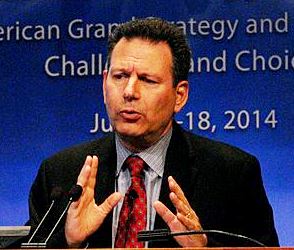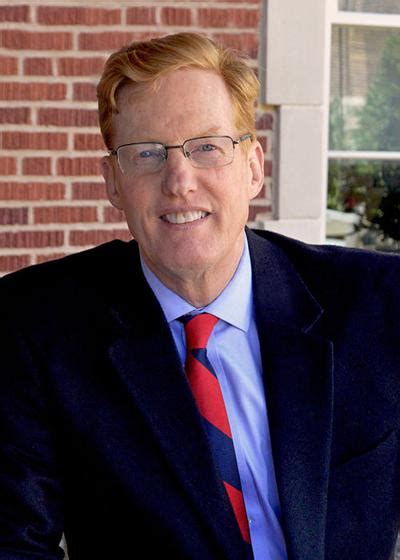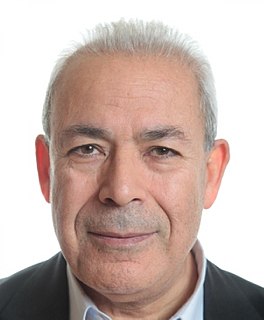Top 872 Syria Quotes & Sayings - Page 15
Explore popular Syria quotes.
Last updated on November 10, 2024.
So there are two separate tracks. One track is for the Syrian government and the opposition that is interested in a peaceful future of Syria to come together for national unity, for the political process. At the same time, it is a requirement for everybody to stop supporting the extremist groups, to stop allowing them safe passage, to stop allowing them to receive weapons, to stop allowing them to receive financial assistance, and to come together in actually fighting them.
Maybe because I'm from New Jersey, I just have this kind of plain language hangup. But I would make very clear - I would not talk to Vladimir Putin. In fact, I would talk to Vladimir Putin a lot. But I'd say to him, "Listen, Mr. President, there's a no-fly zone in Syria; you fly in, it applies to you." And yes, we would shoot down the planes of Russian pilots if in fact they were stupid enough to think that this president was the same feckless weakling that the president we have in the Oval Office is right now.
I don't expect that the president-elect [Donald Trump] will follow exactly our blueprint or our approach, but my hope is that he does not simply take a real-politic approach and suggest that, you know, if we just cut some deals with Russia, even if it hurts people or even if it violates international norms, or even if it leaves smaller countries vulnerable or creates long-term problems in regions like Syria, that we just do whatever is convenient at the time.
While the foreign policy elite in Washington focuses on the 8,000 deaths in a conflict in Syria – half a world away from the United States – more than 47,000 people have died in drug-related violence since 2006 in Mexico. A deeply troubled state as well as a demographic and economic giant on the United States’ southern border, Mexico will affect America’s destiny in coming decades more than any state or combination of states in the Middle East.
Today, the West is confronted by the powers that seek to test our will, undermine our confidence, and challenge our interests. To meet new forms of aggression, including propaganda, financial crimes, and cyberwarfare, we must adapt our alliance to compete effectively in new ways and on all new battlefields.We urge Russia to cease its destabilizing activities in Ukraine and elsewhere, and its support for hostile regimes - including Syria and Iran - and to instead join the community of responsible nations in our fight against common enemies and in defense of civilization itself.
New security architecture is being laid down in the Northern Middle East, Lebanon, Syria, Iraq, in which pro-Iranian governments are consolidating their grip on the territory and they're backed by Russia, to a large degree. And this has caused great grief and consternation in Saudi Arabia and amongst many of the United States' allies, Israel, the Gulf countries, Turkey, because they see this new architecture of security and Iranian influence and Russian influence as something that's very bad for them.
We have Islamic rebels [in Syria] who've been eating the hearts or organs of their enemies. We have priests that have been killed. We have Christian villages that have been razed by Islamic rebels. We have Islamic rebels who say they don't recognize Israel and would just as soon attack Israel as [Bashar] Assad. So really, I see no clear-cut American interest, and I'm afraid that sometimes things unravel, and the situation could become less stable and not more stable.
I'm not talking about him; I'm talking about the countries that go to support [Antonio] Guterres plan, because he needs the support of other countries, he cannot achieve that plan while many countries in the world are still supporting the terrorists in Syria. So, of course we support it, whether helping the people to live, to go back to their country, and to live in security without terrorists.
People are starting to think about let's let a lot of people come in from Syria, even though we know nothing about them, who they are, et cetera, et cetera. But they do have cellphones. And they do have ISIS flags on some of those cellphones. And you say, what are we doing? I don't know if you know but a lot of the cellphones had the ISIS flag on them. And we let them into our country.
What I'm suggesting is we are going to look back, and we're going to see what happened in Syria, and we're going to see the larger destabilization of the Middle East, the rise of extremism, and we're going to wonder... Why didn't we at least try to force a political solution - at an acceptable cost to us, because no one is saying we should send in ground troops - and if we did it would be worse than doing nothing... If we do not act, we are going to look back and wonder why we didn't.
Continuous wars - which we have now had since 2001 - starting with Afghanistan, continuing on to Iraq. And even since Iraq, it's been more or less continuous. The appalling war in Libya, which has wrecked that country and wrecked that part of the world, and which isn't over by any means. The indirect Western intervention in Syria, which has created new monsters. These are policies, which if carried out by any individual government, would be considered extremist. Now, they're being carried out collectively by the United States, backed by some of the countries of the European Union.
We achieved a deal with the Russians that didn't wind up in two days of strikes that would have sent a, quote, "message," but would not have removed the weapons. We struck a deal to get all of the declared weapons out of Syria. Never before in a conflict has that ever happened, that during the conflict weapons of mass destruction are taken out of the zone of conflict. And thank God we did that, because if we hadn't done that, today ISIL would have those chemical weapons in large parts of the country.
In 2009, pre-Hillary, ISIS was not even on the map, Libya was stable, Egypt was peaceful, Iraq was seeing really a big, big reduction in violence, Iran was being choked by sanctions, Syria was somewhat under control. After four years of Hillary Clinton, what do we have? ISIS has spread across the region and the entire world. Libya is in ruins and our ambassador and his staff were left helpless to die at the hands of savage killers. Egypt was turned over to the radical Muslim Brotherhood, forcing the military to retake control. Iraq is in chaos. Iran is on the path to nuclear weapons.
The Syrian people will never forget those who extended their hand to help them rid of their dictatorship. The Syrian people also would love to be friends with all nations. I think the new Syria will contribute greatly to the return of regional stability and the birth of common development with Arab nations and the region. The only exception is those countries that still harm the Syrian peoples and take some of their rights. We are looking for a region where cooperation, prosperity, and peace flourish.
When our embassy is attacked in Benghazi by terrorists and there is no response, you get more bad behavior. When Russia invades Ukraine and there is no response, you get more bad behavior. When Syria crosses the red line and there is no response, you get more bad behavior. When Iran launches tests of ballistic missiles and there is no response, you get more bad behavior. When North Korea attacks Sony Pictures and there is no response, you get more bad behavior. In other words, Mrs. Clinton, you cannot lead from behind. We must respond when we are attacked or provoked.
We are in a struggle against radical Islamic terrorism, al-Qaida and ISIS. The president, in his campaign for office, made it clear that he would make a priority of confronting radical Islamic terrorism abroad. But also adding new measures to ensure that individuals would not be coming into this country with the motivation to harm our people. And we really do believe that this temporary pause with regard to the countries other than Syria, temporary pause where we evaluate our screening process and ensure that people coming into the country don't represent a threat is appropriate.
Wrapping rubber bands around a watermelon is not journalism. It is entertainment. But the key to success in media has always been a broad mix of serious reporting and entertainment. The New York Times does not make its money on reports about Iraq and Syria. It makes money on its gardening section, food and, yes, stories about cats. "The Today Show" is a very successful program because it is a mix of the celebrity chef and the crazy pet who does the rolls and serious news and interviews.
It doesn't matter what a majority of Americans say. George W.Bush is going to do what he thinks he must do. And history may be tough on him in the next ten years but I guess he rationalizes that in fifty or 100 years they'll bless us because there will be - maybe not in his lifetime, but someday-a democratic Iraq emulating the United States in its liberalism, in its fair-mindedness, and that democracy will spread to Iran and Syria, and that whole part of the Middle East will be happy, and terrorism will be gone, and the Israelis will be flourishing, and the oil will flow. That's his vision.
Some people think that the Syrian people are from another planet. On the contrary, I think that we all live inside the same boat, on the same planet. And the Syrian war affects everybody now, the whole world. There are Syrian refugees everywhere now. But it looks like nobody cares about civilians in Syria. They are suffering. There are hundreds of victims - innocent women, children, and old men who are hurt or killed every day - and no one cares about them.
We have to remember examples of many artists of conscious rap who have been coopted by the Department of State of the United States to be cultural ambassadors in different parts of the world, like Syria, like other parts of the Middle East, including conscious Islamic-American rappers that are representing an international political agenda for the United States through cultures more affable for people of color in other parts of the world.
Sadly, a U.S. invasion of Iraq 'would threaten the whole stability of the Middle East' - or so Amr Moussa, secretary-general of the Arab League, told the BBC on Tuesday. Amr's talking points are so Sept. 10: It's supposed to destabilize the Middle East. The stability of the Middle East is unique in the non-democratic world and it's the lack of change in Iraq, Iran, Saudi Arabia, Syria, Egypt that's turned them into a fetid swamp of terrorist bottom-feeders.
We are organising our enemies into a formidable force, we are The US public has turned against the war, the Republicans and Democrats have turned against the war. And so when the American public turns against the war and the Congress turns against the war, it suggests that Americans feel we cannot win that war in those conditions. So the Iraqi Commission says, "Well, we can't win this war militarily, we need to reassess potential allies." There's Syria, there's Iran.
Something is very, very wrong with American culture. The signs are everywhere. I think the country is in almost terminal descent. The business class is combined with the evangelicals. And I think the evangelicals want to provoke an immense global disaster to precipitate the second coming of Christ. So they are very happy about what we're doing to Iraq - and the menace we present now for Syria and for Iran - because they think that the apocalypse is an important thing to get into so that they can see vindicated their most literal interpretation of the Bible.
I can only tell you there's a lot of bad things going on. They're chopping off heads in Syria, and they're chopping off heads all over the Middle East.ISIS is doing a number, and plenty of other beyond ISIS is doing it now. And all I know is that, when they start chopping off heads, we have to be very firm, we have to be very strong, we have to be very vigilant. And I heard a statement, and I disagree with his statement.
If in the past, you didn't cry out when thousands of protesters were killed and injured by Turkey, Egypt and Libya, when more victims than ever were hanged by Iran, women and children in Afghanistan were bombed, whole communities were massacred in South Sudan, 1800 Palestinians were starved and murdered by Assad in Syria, hundreds in Pakistan were killed by jihadist terror attacks, 10,000 Iraqis were killed by terrorists, villagers were slaughtered in Nigeria, but you only cry out for Gaza, then you are not Pro Human Rights, you are only Anti-Israel.
Credible reports came through that Syria had used chemical weapons. Whether it's true actually is still open to question, but it's very probably true. At that point, what was at stake was what is called credibility. So if you read the political actors, political leadership, foreign policy commentary, they constantly point out accurately that US credibility was at stake, and we have to maintain US credibility. So therefore something had to be done to show you can't violate our orders.
I think no country is going to be immune from the Arab awakening because the Arab awakening is driven by deep human longing for dignity, for justice and for freedom. I think that applies to young people in Saudi Arabia as much as to young people in Egypt, Tunisia, or Yemen, or Libya, or Syria. If I were in Saudi Arabia, I would be getting ahead of this and looking for ways to appreciate those aspirations and align my country with them.
In some of the Israeli media, but not all, they read about very nasty things done by Israeli settlers and soldiers to Palestinian Arabs. This is a pain in the neck for many Israelis. They say: Leave us alone, what can we do about it? Or they say: Look at Syria, look at Iraq, the West Bank is paradise by comparison. I was one of the first to say, shortly after the Six-Day War, that occupation is corrupting. It corrupts the occupier and, in a different way, it corrupts the occupied.
Wall Street is a huge issue. And it's controlling our lives today with this so-called election - we really have no choice. We're really just onlookers. The national surveillance state has not been debated by any candidates, Democratic or Republican. Our wars, our repeated wars - our new war in Syria has not been brought up because everyone agrees essentially that we have to continue doing what we're doing. And maybe even now go back to Libya.
To me, what I've always said is that the president [Barack Obama] has set up an awful situation through his deal with Iran, because what his deal with Iran has done is empower them and enrich them. And that's the way ISIS has been created and formed here. ISIS is created and formed because of the abuse that [Bashar] Assad and his Iranian sponsors have rained down on the Sunnis in Syria.
Now let's make two things clear: ISIL is not 'Islamic.' No religion condones the killing of innocents, and the vast majority of ISIL's victims have been Muslim. And ISIL is certainly not a state. It was formerly al Qaeda's affiliate in Iraq, and has taken advantage of sectarian strife and Syria's civil war to gain territory on both sides of the Iraq-Syrian border. It is recognized by no government, nor the people it subjugates. ISIL is a terrorist organization, pure and simple. And it has no vision other than the slaughter of all who stand in its way.
If I look at the really important questions in [Middle East] region, I see Iran, where there is a strong desire for a freer society and where people are repressed by a small group of ayatollahs. I see Syria, where we can see a similar desire of the people to be free. These two countries fund Hezbollah and other terrorist organizations and are hurting our efforts in Afghanistan and have been extremely harmful in Iraq. Then I also see large, important countries such as Egypt and Saudi Arabia.


























